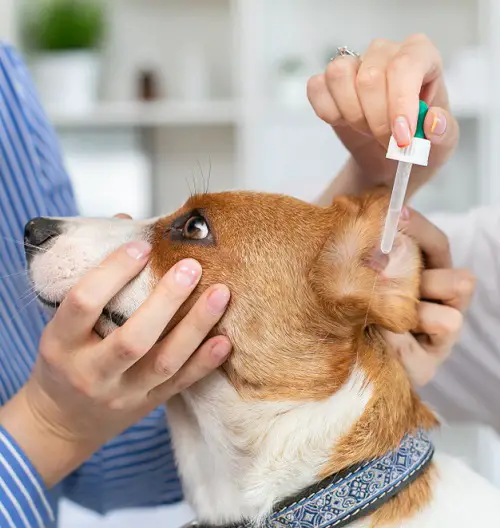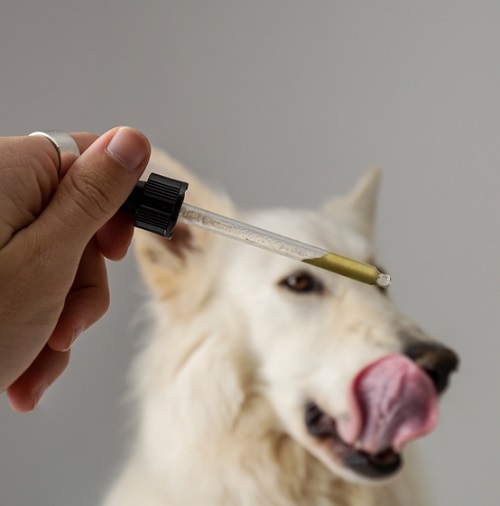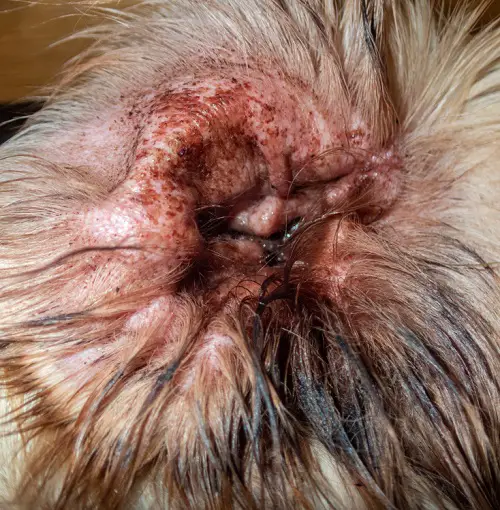Does your dog keep scratching its ears? Does using castor oil for dogs’ ears work? Scroll down to explore it deeper!
While castor oil has several benefits for humans, does it carry the same potency for pets? Is it safe to use castor oil for dogs’ ears? Let’s learn below!
Does Castor Oil For Dog Ear Work?

Yes, castor oil can help treat ear infections in dogs, particularly those caused by bacteria or yeast. It has natural antifungal and antibacterial properties that can fight off infections.
Castor oil is also great for treating dry, itchy skin in dogs. Thanks to its high fatty acids and vitamin E content, it helps moisturize and soothe irritated skin. Apply a small amount of oil to the affected area and massage it gently. Always use castor oil in moderation and check with your vet first, especially if your dog has sensitive skin or is prone to allergies.
Ways To Use Castor Oil For Dog Ears

Castor oil, with its rich anti-inflammatory properties, serves as an excellent agent in calming ear irritations in dogs. If your dog seems to be scratching their ears more often or showing signs of discomfort, a few drops of castor oil might do the trick. Here’s how you can use it effectively:
1. Treating Ear Infections in Dogs with Castor Oil
Castor oil is a natural remedy known for its antibacterial, antifungal, and anti-inflammatory properties, making it a good option for easing your dog’s ear discomfort.
How To Do Apply?
To use castor oil for ear infections, put a few drops on a cotton ball and gently massage it around the outside of your dog’s ear canal. This can help reduce the infection. However, it’s important to get approval from your vet before trying this treatment, especially when applying it near or inside your dog’s ears.
2. Ear Wax Removal Made Easy
Castor oil isn’t just a one-trick pony. It’s also effective in removing ear wax build-up in dogs. If you notice your dog’s ears are getting a bit waxy, castor oil can come to the rescue.
How To Do Apply?
Apply a few drops of the oil to a cotton ball and carefully clean around the ear canal. This simple step can help soften the wax, making it much easier to remove and ensuring your dog’s ears are free from blockage.
3. Preventive Measures for Ear Health
Prevention is better than cure, and castor oil can be valuable to your dog’s ear care routine. You can use castor oil as a weekly spa treatment for your dog’s ears, keeping them in tip-top shape.
How To Do Apply?
By applying a few drops of castor oil to a cotton ball and gently rubbing it around the ear canal weekly, you can help prevent ear infections and maintain the cleanliness and health of your dog’s ears.
4. Castor Oil for Maintaining Ear Hygiene
Castor oil is not just for treating issues; it can also be an integral part of your dog’s ear hygiene routine. Regular use can help keep ear infections at bay. Add castor oil to your weekly pet grooming ritual.
How To Do Apply?
A gentle wipe around the ear with a castor-oil-soaked cotton wipe can keep the ears clean. After baths, castor oil can help dry out any residual moisture in the ears, which is a common cause of infections.
Precautions To Consider

- Always consult your veterinarian before introducing any new element into your pet’s healthcare routine.
- Use high-grade, pure castor oil to avoid any contaminants that might harm your dog.
- Keep an eye on how your dog reacts to the oil. Discontinue use if you notice any negative responses.
- The ricin in castor beans can cause all kinds of problems if ingested may cause stomach ache, drooling, tremors, etc.
Signs Of Ear Infection In Dogs

- When your dog shakes their head incessantly, it’s more than just a quirky behavior. This is often a telltale sign of discomfort in their ears. The movement is an attempt to relieve irritation or pain in the ear canal.
- Watch out if your dog frequently scratches at one ear. It’s a direct response to itchiness or pain, signaling that something’s not right inside the ear.
- If you spot a dark, often malodorous discharge coming from your dog’s ear, it’s a red flag. This discharge is typically a mix of ear wax, blood, and pus, indicating a severe infection.
- A healthy dog’s ear doesn’t emit a strong smell. If you detect a bad odor from your dog’s ears, it’s a clear indicator of an infection brewing inside.
- Just like humans, dogs show redness and swelling in affected areas. If you notice these symptoms in their ear canal, it’s a visual cue of an ongoing infection or irritation.
- If your dog yelps or withdraws when you touch its ears, this reaction signifies pain in the ear, often a consequence of an underlying infection.
- The presence of crusts or scabs inside or around the ear area is a symptom often overlooked. It’s usually the aftermath of them scratching aggressively due to the infection.
Castor Oil For Dogs Ear- Final Words
Castor oil, a substance with centuries-old therapeutic uses, effectively soothes skin issues, combats fleas and ticks, and may even help prevent or eliminate cancerous growths. In dog care, it treats ear infections and removes ear wax.
For your furry friend’s health problems like skin conditions or benign growths, castor oil can be beneficial. However, always follow your vet’s instructions and avoid internal use. If you’re considering castor oil for your dog’s ear infection, strictly adhere to your vet’s guidelines.
